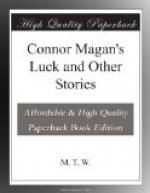The funniest part of it was, the child hadn’t been asleep five minutes. She had been idly listening to a spelling class, and just after the word “sail” dropped into a nap.
By the way, perhaps I should not omit to mention that before she went to school that morning she had declared to her mother that boys were bothers; no wonder! baby Willie, at breakfast, had punched his little fist down into her mug, spilled the milk, and sent the mug crashing on the floor. Johnny had taken the orange out of her sacque pocket, and she had to let him have it because he was “a little fellow,” and Harry and Tommy had carried all the cookies to school in their pockets.
But now—after the dream, Molly hugged the baby; and she said confidentially to mamma, “Isn’t he sweet?—I don’t think boys are a bother, do you, mamma?”
And a little later, while rocking her old rag-doll, “mamma,” said she, “I won’t ever swing on the front-gate again ever—ever—ever in my life.”
A STORY OF A CLOCK.
My real name was so short that I was called Nancy, “for long.” I was the fourth child in a very large family. The three elder were a brother and two sisters. The first, very quick at books and figures, finished his education at an early age, and seemed to me about as old and dignified as my father. My sisters, Sarah and Mary, were exemplary in school and out. The former, at eight, read Virgil; painted “Our Mother’s Grave” at eleven—’twas an imaginary grave judging from the happy children standing by; wrote rhymes for all the albums, printed verses on card-board and kept on living. Mary read every book she could find; had a prize at six years of age for digesting “Rollins’ Ancient History;” had great mathematical talent, and though she sighed in her fourteenth year that she had grown old, yet continues to add to her age, being one of the oldest professors in a flourishing college.
With such precedences, it is not strange that my parents were astonished when their fourth child developed other and less exaggerated traits, with no inclination to be moulded. Within ten months of my eighth year, my teacher, who had previously dealt with Sarah and Mary with great success, made the following remark to me: “If thou wilt learn to answer all those questions in astronomy,” passing her pencil lightly over two pages in Wilkin’s Elements “before next seventh day, I’ll give thee two cents and a nice note to thy parents” (my father was a scientific man, and my mother a prime mover in our education).
“Two cents” did seem quite a temptation, but the lesson I concluded not to get. “I worked wiser than I knew.” I may have wanted a “two cents” many a time since, but I never was sorry about that. Spelling, arithmetic, grammar, geography, history and reading, though they were the Peter-Parley edition, seemed about enough food for a child that was hungering and thirsting for a doll like Judith Collin’s, and for capacity to outrun the neighboring boys. To be sure the recitation in concert, where the names of the asteroids, only four in number (instead of a million and four) were brought out by some of us, as “vesper,” “pallid,” “you know,” and “serious” showed that we did not confine ourselves too closely to the book.




